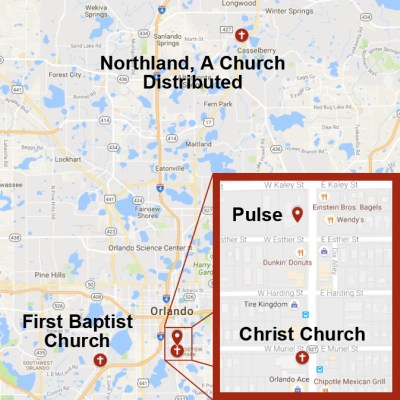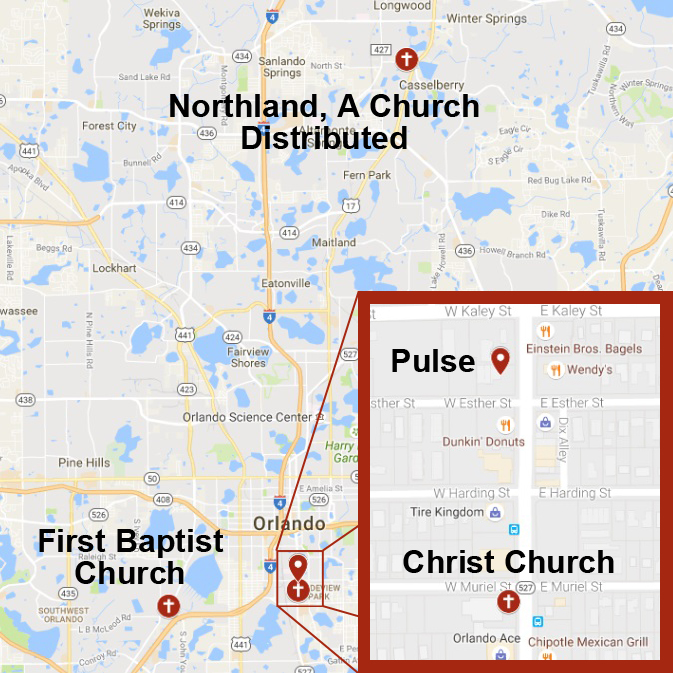On Sunday, June 12, 29-year-old Omar Mateen stormed into Pulse, a gay nightclub in Orlando, and gunned down 49 people and wounded 53 others. Shortly before the attack, Mateen called 9-1-1, pledging allegiance to ISIS. The shooting was the deadliest by a single shooter in history, the deadliest act of violence against LGBT people in US history, and the deadliest terrorist attack in the US since the 9/11 attacks in 2001.
The club was holding its weekly “Upscale Latin Saturdays” event, attended by about 320 people. When shots were fired just after 2 a.m., some patrons assumed they were firecrackers or loud parts of the music.
People poured into the streets of the surrounding neighborhood, some carrying injured friends to emergency responders. Others were trapped inside, held hostage by Mateen until 5 a.m. when police, led by a SWAT team, entered the building and killed Mateen.
Hundreds of people watched from a distance, waiting to learn if friends and loved ones had survived.
Christ Church
Paul Valo, lead pastor at Christ Church, Orlando, was leaving for church that morning when he received a call telling him that volunteers were having trouble getting to the church, only five buildings from Pulse, due to an incident at the nightclub. Once Valo arrived, he and other staff members and volunteers gathered to pray. “We knew we were in the epicenter of something that was probably going to affect our city and maybe our nation.”
After praying, Valo and his team started handing out water and other items from the church’s cafe to emergency responders.
Before the attack, Christ Church had been active in community service, responding to needs of the homeless. The shooting, however, provided new ministry needs they could never imagine.
Christ Church has been in its location for 12 years, and the leadership had prayed often about possibly relocating. However, “On that morning, we realized this was where we were supposed to be,” said Valo. “We took almost no thought for our church. We didn’t hold services. We didn’t do anything except begin to serve the first responders who were outside our doors.”
For 11 days, Christ Church fed hundreds of first responders—including FBI, DEA, and ATF—around the clock and allowed them use their building for rest. Even the governor and other city officials used their facilities. “We didn’t allow cameras in,” said Valo. “We wanted to provide a place of sanctuary for them.” The public relations director from the police department told him, “I haven’t gone to the bathroom or eaten anywhere except in this building for four days.”
On the eleventh day, a first responder told Valo, “A man who lives in one of the houses behind Pulse is having an anxiety attack. Would one of you come down and help?”
Valo and several others visited the man and discovered trauma throughout the neighborhood. “Neighbors opened up their blinds in the middle of the night and saw people who were wounded, bloody, and screaming in terror running through their yards,” said Valo. “Many of them didn’t leave their houses for days afterward.”
In response Christ Church sent volunteers to visit all the homes around Pulse, checking on people’s wellbeing, ensuring they had medication if needed, and providing them with food and transportation.

First Baptist Church
Other Orlando churches share similar testimonies of ministry in the midst of tragedy. When David Uth, senior pastor of First Baptist Church of Orlando, heard of the shooting, he contacted several local pastors, telling them, “We have to minister to this community. This is a broken place now.”
For First Baptist, that meant serving the Hispanic community. The church’s Spanish-ministry pastor assessed needs and looked for ways to demonstrate the love of Christ. The church became aware of two young men critically wounded in the attack who were in intensive care and would soon lose their condo because they could not work.
“We contacted them and told them not to worry,” said Uth. “We told them we were going to cover their rent until they were able to get back on their feet.”
First Baptist also offered their facilities free of charge to victims’ families who wanted to hold funerals for their loved ones.
As a result, the church has become home for some who were at Pulse on the night of the attack. “We have baptized seven of those who were in the club,” said Uth. “One young lady who was shot nine times has made this her home, and she will tell you, ‘This is where I feel loved and cared for.’ ”
“You all are more loving and accepting of us as humans than the open and affirming churches we come from.”
Though First Baptist does not condone same-sex relations, Uth said that some of the victims who now attend told him, “You all are more loving and accepting of us as humans than the open and affirming churches we come from. We know what this church believes [regarding homosexuality], but we see that your love for us is bigger than anything we could ever imagine.”
The church’s acceptance of the victims has stretched some of the congregants, said Uth. They wanted to know if the church had changed its stance on homosexuality, to which Uth said no. “Agreeing with someone is not a prerequisite for loving them,” he said. “When I put my arms around these young people who were at the club, I see them not as an issue, but as people. I remember what Jesus said when he saw the crowd: They were like sheep without a shepherd” (Matt. 9:36).
Northland, A Church Distributed
One of the pastors Uth contacted after the attack was Joel Hunter, senior pastor of Northland, A Church Distributed. Hunter said he realized through the tragedy just how out of touch he had been with the LGBT community.
Shortly after the attack, Northland participated in a multi-church prayer service, segments of which were led by pastors from different churches. For his segment, Hunter was asked to pray for people in the LGBT community, but he felt ill-equipped to lead it. He told his congregation, “I’m devastated by this, not because I have so many relationships in that community, but because I have so few.”
Hunter invited a member of Equality Florida—a civil rights organization dedicated to securing full equality for Florida’s LGBT community—to explain to the gathering of evangelicals what LGBT people were feeling in the wake of the attack. “It was a moment for many of us to recognize that we had left a part of our community out of our own experience,” said Hunter. “You can’t go through a tragedy of this magnitude and not be brought face to face with your own exclusivity, with your own pride, with your own divisions, and feel God’s call to repentance.”
Orlando Today
To this day, churches in Orlando still feel effects of the attacks. Said Valo, “People have told us they’re afraid just to drive to church, simply because of our proximity.” Anxiety levels are high, yet Valo believes this is a time for churches to learn, grow, and watch God work. “The [grieving] process isn’t always linear. You want to go to the next step, and something derails you. But if you simply continue to lean on God as best as possible, he’ll show up eventually.”
As pastors, we make a living by talking. But when a tragedy hits your community, just be there and listen.
One lesson Valo has learned in the last few months is that, more than any physical aid, people need relationships. “Many times when we’re involved in ministry, it’s easy for us to develop systems. And we expect those systems to bring ministry. But what people need most is to be connected with people.” Specifically, they need pastors and church members, he said. “They need people who hug them and sit with them and listen to them.”
Uth agrees. “As pastors, we make a living by talking. But when a tragedy hits your community, just be there and listen. God has broken me of the judgmental, critical spirit toward persons because of choices in their life or things they believe.” Since the attack, he has increasingly realized that while he was a sinner, Christ died for him. As a result, “My whole approach [to ministry] has changed.”
Hunter said he learned just how important pastors are to the life of a community. “People will turn more to their pastors and religious leaders in times of tragedy, grief, or hurt than to any other person.”
He also recognizes the ongoing need to search his soul. “We live in a culture where the automatic default is to blame somebody.” Struck by Jesus’ remarks in Matthew 7:3 (“Why do you look at the speck of sawdust in your brother’s eye and pay no attention to the plank in your own eye?”), Hunter said he has been forced to evaluate himself: “This is part of what I’ve left undone, both for my community and for myself. I don’t have a lot of relationships with that part of our community. Why not? Why haven’t I reached out?”
When asked if he felt like the country has moved on and forgotten about Orlando, Valo said, “Nationally, [tragedies like this] get overshadowed by the next thing. But those of us in this community know the hurts are still real.” Valo and Christ Church have committed to ministering to their community for as long as it takes. “We continue to minister at Pulse. We have people who stand outside the nightclub and care for anyone who looks like they need prayer or words of counseling or comfort. We want to set an example for the rest of the nation and for people who will walk through something like this in the future.”
Kevin P. Emmert is a Developmental Editor at Moody Publishers in Chicago, Illinois.
Maina Mwaura is Family Pastor at First Baptist Church Lithia Springs in Georgia.










